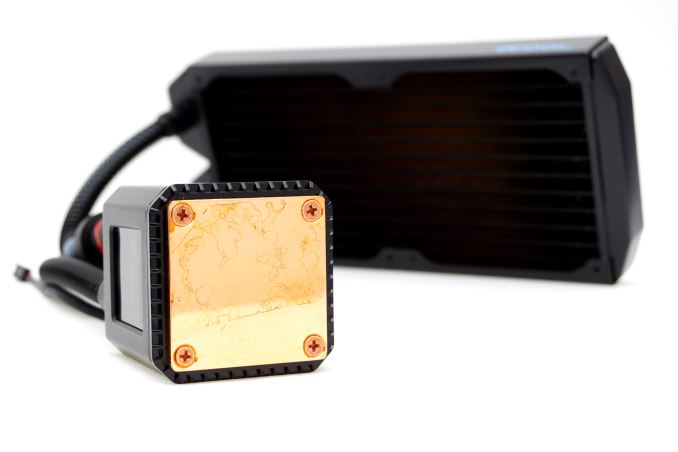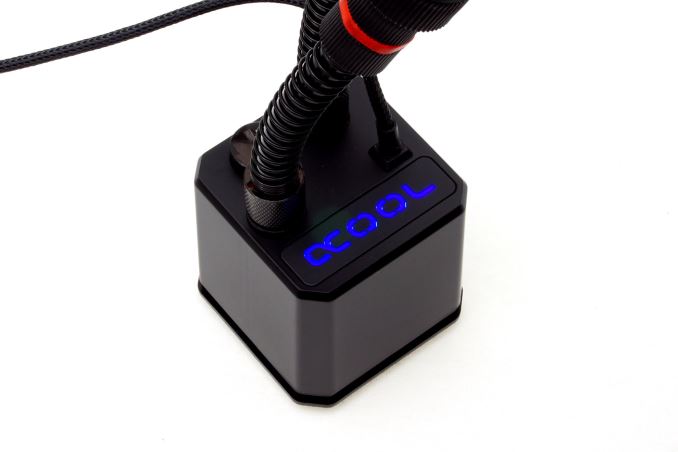The Alphacool Eisbaer 240 CPU AIO Liquid Cooler Review
by E. Fylladitakis on August 1, 2016 9:00 AM EST- Posted in
- Cases/Cooling/PSUs
- AIO
- Water Cooling
- Cooler
- Alphacool
Conclusion
In this review we had a look at Alphacool’s latest product and first AIO liquid cooler, the Eisbaer, which the company is marketing as an “extremely quiet, expandable solution”. It is true that the supplied 120 mm “Eiswind” fans did perform very well and that the ceramic pump is practically noiseless, making the Eisbaer 240 the least noisy AIO liquid cooler that we have tested to this date. Our only concern lies with the long term reliability of the fans, as while sleeve bearing engines are amongst the least noisy options, they lack the long-term reliability of other solutions that are noisier or expensive.
While the Eisbaer 240 did not outperform every other similar cooler in terms of raw thermal performance, it possibly has the best noise/performance ratio of every dual 120 mm fan AIO cooler available today. It could likely outperform several of its competitors if stronger fans were to be used, but we feel that Alphacool’s choice of fans in terms of noise performance hits the mark. Users can fall into two categories - thermal or acoustic performance, and a user that places acoustic comfort above a slim difference in thermal performance will do well here. Even with its quiet fans, the thermal performance of the Eisbaer is very good and more than adequate for the typical gamer/enthusiast that simply wants a cool and quiet high performance system.
The expandability of the Eisbaer 240 is one of the primary focus points of Alphacool’s marketing team. It is true that the Eisbaer 240 is very versatile, offering expansion options depending on the user’s skill and needs. It has a quick release connector on the tubing for users that want to keep things simple and expand using parts that the company supplies specifically for the Eisbaer, plus the company has simple tube compression fittings installed on every part that allow the user to completely remove the tubing if necessary. The Alphacool Eisbaer 240 practically is a standard, divisible liquid cooling kit that is being supplied preassembled and prefilled by the company.
Expanding the Eisbaer may be a relatively simple process but the user has to take into account the impact that the expansion will have on the performance of the system. For example, the insertion of a GPU block will add both resistance and thermal energy into the system, respectively reducing the flow of the pump and increasing the load of the radiator. A second radiator will offer quicker thermal energy dissipation but significantly burdens the pump. In theory, a single loop can be expanded to cover multiple GPU blocks and more than one radiator but, as the pump cannot be upgraded, we advise against the installation of more than three items per system. It is technically possible to add an external pump into the system but that would beat the purpose of having an AIO solution in the first place, as a customized kit would perform better and cost less at this point. Alphacool has informed us that they are currently designing a similar AIO liquid cooler for GPUs, the GPX-Pro. When the GPX-Pro becomes available, the interconnection between the two system will be possible, allowing them to share their radiators and double the pressure (but not the flow) of the pumps. Whether having the two systems interconnected will perform better than keeping them separated is a complicated discussion that depends on many specific details, such as the CPU/GPU, the position of the radiators, the strength of each pump, the usage of the system, etc., preventing us from being able to provide a simple and definite answer.
Alphacool currently retails the Eisbaer 240 in Europe for €115 incl. VAT plus shipping costs. Slightly lower pricing may be found via some of their local resellers. In the US, the Eisbaer 240 is available for $120 plus shipping. The price is higher than that of most similar competitive products, but reasonably so for a product that offers an expandable setup with a copper radiator and high thermal performance combined with near-silent operation. We highly recommend it to those seeking a low noise AIO cooling solution, especially when there is a significant preference for potential future expansions/upgrades.












69 Comments
View All Comments
b4bblefish - Monday, August 1, 2016 - link
No compact ITX case can support a full cooler so the performance of having the closed loop coolers is amazing compared to low profile air.retrospooty - Monday, August 1, 2016 - link
Agreed, but I guess my point is any compact Mini ITX case can fit an air cooler that is very capable. There are also plenty of good Mini ITX cases that fit full size coolers. http://www.newegg.com/Product/Product.aspx?Item=N8...Stuka87 - Monday, August 1, 2016 - link
They may run cool at stock speeds, but water cooling is very nice for over clocking. My 4.5GHz 4690K very rarely goes over 55C.retrospooty - Monday, August 1, 2016 - link
Yes, but most of todays high end air coolers are just as capable and they do it without adding the need for water, the placement of a radiator or the additional potential fail-point (and noise point) of a water pump.retrospooty - Monday, August 1, 2016 - link
/edit - just as capable even when overclocking.ikjadoon - Tuesday, August 2, 2016 - link
Noise is no longer a concern with Gen5 Asetek.Here's a 120mm rad with 2 fans....5C cooler than the Noctua NH-U14S and STILL 0.1dB quieter than Noctua.
http://www.hardocp.com/article/2016/02/11/arctic_c...
Asetek Gen5 is what AIO CLCs were meant to be...
r3loaded - Monday, August 1, 2016 - link
Yeah, the Noctua NH-U14S cools just as well as the best AIO water coolers, but beats them by being much quieter on top of that since there's no pump noise. Zero risk of leaks is a bonus too!retrospooty - Monday, August 1, 2016 - link
Exactly... Not just the Noctua, pretty much any high end air cooler equals, if not outperforms water on todays CPU's, even when overclocking.ikjadoon - Tuesday, August 2, 2016 - link
You are far behind the times. :(http://www.hardocp.com/article/2016/02/11/arctic_c...
That was in February, dude.
AnnonymousCoward - Monday, August 1, 2016 - link
I use a NH-U14S with an OC'd 6700K that runs all 4 cores at 4GHz. The highest temp I can hit with any stress test is about 30C over ambient (~55C).This AT review had a noise floor of 30 dBA, while the Noctua with its adapter maxes out at 19 dBA according to their spec (and is far lower using PWM). I have to doubt a water cooler can get anywhere near this low, which is critical for my silent box.